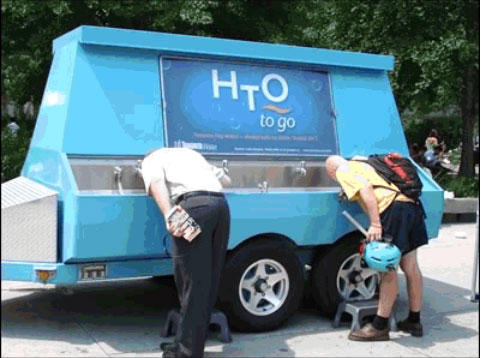
Some parts of Ontario, Canada, is experiencing extreme heat for many days.
Toronto Water provides FREE HTO To Go mobile water trailers which are available for special events (10,000 or more attendees) throughout Toronto.
Here are the following highlights of the HTO To Go mobile water trailer :

- HTO To Go crew will deliver the HTO To Go mobile water trailer to select public events and
- connect it to a safe supply of potable water (usually a fire hydrant or connection to a water main);
- visitors are welcome to have a drink or refill their water bottle — there is even a doggy bowl for our furry friends;
- the season generally runs from April through September
- It’s FREE!
The HTO To Go mobile water trailer’s features include:
- Bright, attractive trailer, with signage to entice visitors
- A stainless steel trough on each side of the trailer
- 10 drinking taps (five on each side)
- 10 spigot taps (five on each side) for filling drinking bottles
- Step stools for children and cups available to accommodate accessibility challenges
- Automatically-refilling doggy bowl at the back
- Professional and courteous crew who take care of the trailer from start to finish
Please click on the following text to:
- find out more about the event selection criteria,
- to request an HTO To Go water trailer at your event, and
- to book a HTO To Go trailer for a public event
In order to save time and water, Toronto Water offers the following tips for using water in gardening and car washing.
Gardening
- Water in the early morning to reduce water lost to evaporation.
- Let water soak in – don’t apply water faster than your soil can soak it up.
- If water is running off your lawn, it’s time to stop.
- Lawns only need about 2.5 cm (about one inch) of water once a week – use a rain gauge to keep track.
- In extended dry periods, a lawn may wilt, turn brown and become dormant but it will turn green again when regular moisture conditions return.
- A healthy lawn can survive several weeks in a dormant state.
- Sweep sidewalks and driveways clean instead of using a running hose.
- Disconnect your downspouts from the sewer system and use the rainwater to water your grass and gardens.
- This job can be made easier if you install a rain barrel.
- Trees need moist soil to grow.
- During periods of little or no rain, new trees should be watered about twice a week.
- A deep soaking that allows the water to reach the roots is best.
Please click here for more info.
Car washing
Did you know that the dirt on cars can contain toxic chemicals, heavy metals, oil and grease?
When you wash a car in your driveway or on the street, that dirty water runs into the storm sewers and straight into local waterways.
To avoid having dirty water run into the storm sewer system, please consider these options for washing your car:
- Use a commercial car wash facility.
- These facilities are required to follow a set of practices determined by the City of Toronto, including treating wastewater and discharging it into the sanitary sewer system, where it will receive further treatment.
- Dispose of the wastewater into the sanitary sewer.
- By using a pail, washcloth and only a small amount of water and then wiping the car dry, the wastewater can be contained in the bucket and disposed of into the sanitary sewer through a laundry sink or toilet.
- Doing this means the wastewater will be treated at a wastewater treatment plant.
- Find a location where the wastewater won’t flow into the storm sewer.
- For example, washing and rinsing your car on a porous surface such as gravel will allow the wastewater to be absorbed.
“All of these options will improve the quality of local waterways including Lake Ontario and help protect aquatic environments from the effects of dirty water entering the storm sewers.”
Please click here for more information about car washing.
For additional information about Toronto Water’s programs and services, please click here.
Toronto, Ontario, Canada
News Release
July 21, 2011
Water-use tips for the hot summer weather
During the hot weather, many Toronto residents are spending more time in the garden and around the home. The City of Toronto’s Water division (Toronto Water) offers the following tips to help residents save time and water while protecting their home and the environment.
Gardening
• Water in the early morning to reduce water lost to evaporation.
• Let water soak in – don’t apply water faster than your soil can soak it up. If water is running off your lawn, it’s time to stop.
• Lawns only need about 2.5 cm (about one inch) of water once a week – use a rain gauge to keep track. In extended dry periods, a lawn may wilt, turn brown and become dormant but it will turn green again when regular moisture conditions return. A healthy lawn can survive several weeks in a dormant state.
• Sweep sidewalks and driveways clean instead of using a running hose.
• Disconnect your downspouts from the sewer system and use the rainwater to water your grass and gardens. This job can be made easier if you install a rain barrel.
• Trees need moist soil to grow. During periods of little or no rain, new trees should be watered about twice a week. A deep soaking that allows the water to reach the roots is best.
More information: http://www.toronto.ca/watereff/landscaping.htm
Prevention of basement flooding
Summer and fall can sometimes bring extreme storms. With that in mind, now is the perfect time to consider different ways to protect your basement from flooding.
• Disconnect your downspout and use the rainwater to water your grass and gardens.
• Clear eavestroughs and downspouts of debris.
• Install a backwater valve and a basement sump pump.
• Ensure the ground is sloping away from foundation walls.
• Seal window wells and fix leaks in basement walls and around windows.
• Use soft-surface landscaping such as porous pavement and ground cover, and consider possibly increasing the amount of green space on your property. Doing so will help absorb rain water, protecting your basement from flooding and local waterways from excess stormwater.
More information: http://www.toronto.ca/water/sewers/basement_flooding.htm
Car washing
The dirt on cars can contain toxic chemicals, heavy metals, oil and grease. When you wash a car in your driveway or on the street, that dirty water runs into the storm sewers and straight into local waterways.
To avoid having dirty water run into the storm sewer system, consider these options for washing your car:
• Use a commercial car wash facility. These facilities are required to follow a set of practices determined by the City of Toronto, including treating wastewater and discharging it into the sanitary sewer system, where it will receive further treatment.
• Dispose of the wastewater into the sanitary sewer. By using a pail, washcloth and only a small amount of water and then wiping the car dry, the wastewater can be contained in the bucket and disposed of into the sanitary sewer through a laundry sink or toilet. Doing this means the wastewater will be treated at a wastewater treatment plant.
• Find a location where the wastewater won’t flow into the storm sewer. For example, washing and rinsing your car on a porous surface such as gravel will allow the wastewater to be absorbed.
All of these options will improve the quality of local waterways including Lake Ontario and help protect aquatic environments from the effects of dirty water entering the storm sewers.
More information about car washing: http://www.toronto.ca/water/protecting_quality/pollution_prevention/car_washing.htm
Additional information about Toronto Water’s programs and services is available at http://www.toronto.ca/water.
Toronto is Canada’s largest city and sixth largest government, and home to a diverse population of about 2.6 million people. Toronto’s government is dedicated to delivering customer service excellence, creating a transparent and accountable government, reducing the size and cost of government and building a transportation city. For information on non-emergency City services and programs, Toronto residents, businesses and visitors can dial 311, 24 hours a day, 7 days a week.
——————————————————-
You may also want to know:
